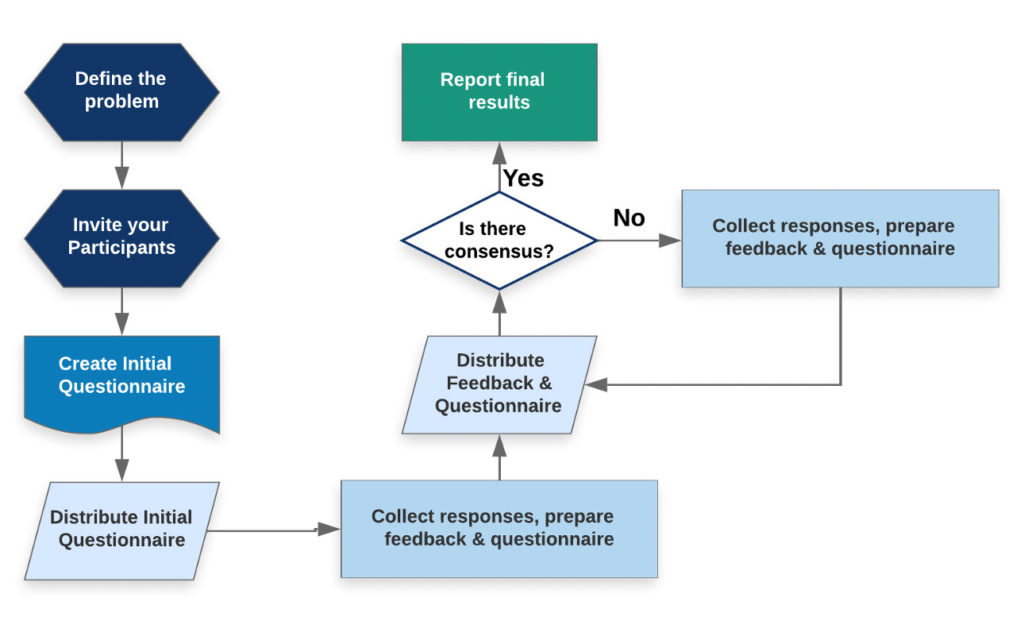
Effective decision-making is not only the means but also an end to a rational way of gaining success. Organizations use the principle of collective decision-making to enhance the quality of their decisions and their results. Professionals employ the Delphi method to translate a similar approach in research and strengthen their findings.
The idea of collective intelligence generates a pool of ideas. It provides a subset of the best ways to deal with any problem. Also, the approach is advantageous in reaching a collective conclusion while giving everyone the space to speak their mind. This further lowers the chances of conflicts.
In today’s blog, let us dig into the real meaning of the Delphi method, its significance, and the best ways to implement it. Read on to explore further!
What is the Delphi Method?
Whether it is the corporate world, a scientific institution, or policymakers, building group consensus is a crucial step. This often leads us to the most appropriate manner of facing any obstacles, given the resources available at the time. Hence, various methods were developed to enhance the practices of collective consensus.
The Delphi method is one of the primary applications of the principle that uses collective decision-making, considering everyone’s perspective.
The method uses anonymous surveys to reach group discussions that most members accept.
Delphi method forecasting is done using a panel of experts who have deep knowledge regarding the proposed topic of discussion. They are served several rounds of questionnaires which give the direction of group opinion.
As multiple rounds take place, these experts can bring their arguments in correspondence with the thinking of the majority in the group. The opposite arguments also give the researcher an insight into alternative measures or aspects of the research.
Must Read: Popular Data Collection Methods To Draw Meaningful Conclusions Real-Life Examples of The Delphi Method
For example, whenever a development company plans to release software, product managers are asked to review the success rate of the product. Their answers are often drastically different in the beginning.
After the management reviews and shares feedback on the collected responses, managers adjust their submitted answers again. This is repeated for three rounds until everyone reaches and agrees to a final success rate of the product.
In the corporate sector, major clients are found and discussed in a manner that considers all team members. Big projects can’t obviously be run by managing directors alone. Hence, firms try their best to accommodate all the stakeholders’ ideas and aim before making a decision that concerns all the firm’s workers.
In other situations, the Delphi method is used for physiotherapy, healthcare research, concluding scientific theories, etc.
Delphi Method Advantages and Disadvantages
The Delphi Method is an organized method for gathering suggestions and viewpoints from a group of experts in order to make wise decisions or projections. The Delphi method has the following pros and drawbacks:
Advantages
- Anonymity
The Delphi method enables anonymous input from participants, which may promote frank and open criticism. Because experts may openly voice their thoughts without being intimidated by social pressure or bias, the outcomes are more accurate and objective.
- Multiple Iterations
It is an iterative process that often comprises several rounds of data gathering and feedback, allowing for the gradual improvement and revision of ideas. By incorporating new data and reducing biases and errors throughout the process, more robust and accurate results are produced.
- Expertise
The approach entails gathering feedback from a group of subject-matter specialists with a specific understanding of the pertinent sector. This makes it possible to guarantee that the information acquired is reliable and founded on professional judgments, which may result in more sensible and well-informed decisions.
Disadvantages
- Time-Consuming
The Delphi method involves several rounds of data collecting, analysis, and feedback, which can take a lot of time. Delays in decision-making may result from this, particularly in instances where time is of the essence.
- Lack of Diversity
The method frequently uses a predetermined panel of experts, which may not accurately reflect the range of viewpoints and opinions within a particular area or community. This may result in biases and restrictions on the results’ ability to be generalized.
- Costly
Organizing and managing a panel of experts, gathering and analyzing data, and providing comments with all needed resources when using the Delphi method. This can be expensive, primarily when experts are used from several regions or when conducting large-scale Delphi studies.
ALSO READ: Data Interpretation: Making Your Survey Data Usable What is A Delphi Method MCQ?
A Delphi MCQ consists of a series of multiple questionnaires which are presented round-wise to the responders. It helps researchers to develop ideas or predict the course of future events which might affect the organization.
The content of the questionnaires gets modified on the basis of responses which are received in the previous round.
Today, the internet provides a variety of Delphi method software which are online tools assisting in the decision-making process. This software supports long-distance management of Delphi responses and statistically aligns the responses received to present important ideas to the researchers. These help track the responses and create personalized surveys for different research methodologies.
What Are The Steps of The Delphi Technique?
Delphi is not a one-level process, which brings it so much validity. A good Delphi research targets problems from all possible angles and tries to devise techniques to deal with those problems with consensus.
- Step-1
The first step is choosing the moderator or facilitator of the entire research. The researcher himself can do this or, to ensure even less bias, a person who has an opinion about evaluating the responses on the questionnaires.
- Step-2
The right experts have to be summoned depending on the field to which the research question generally belongs. These would be people who give their most logical and honest opinion about the various aspects of the problem.
- Step-3
Like in most research, the target question here has to be crystal clear and that which correspond with the hypothesis of the researcher. A clear research question would enable experts to think in the best direction possible.
- Step-4
Make questionnaires and ask for anonymous answers to multiple questions. Once you receive the responses, present them to all the experts for discussion. This is where the group’s thinking aligns. This method must be done at least thrice.
- Step-5
After the 4th round, the responses present the clearest picture of expert opinion on your problem question. The researcher must then sit down to act on the responses and consider their findings.
Takeaway
The Delphi method is truly an extremely useful research methodology in the modern day since it allows for the remote gathering of expert opinions while maintaining anonymity and minimizing biases.
It enables iterative feedback and improvement, resulting in better decisions. Delphi is a relevant and helpful method in dedicated research and decision-making processes because it can help gather trustworthy views from a wide range of specialists in an era of globalization and differing opinions.
Ready To Future-Proof Your Business?
Sign-up for a FREE account and get a sneak peek into our intuitive survey dashboard panel.
Free Trial • No Payment Details Required • Cancel Anytime


